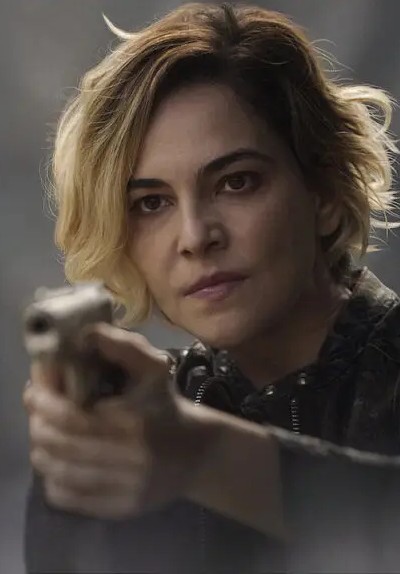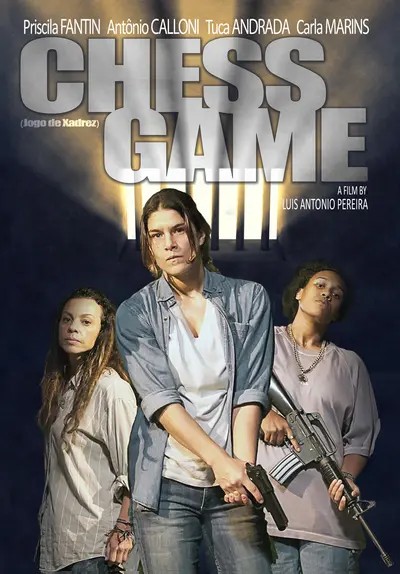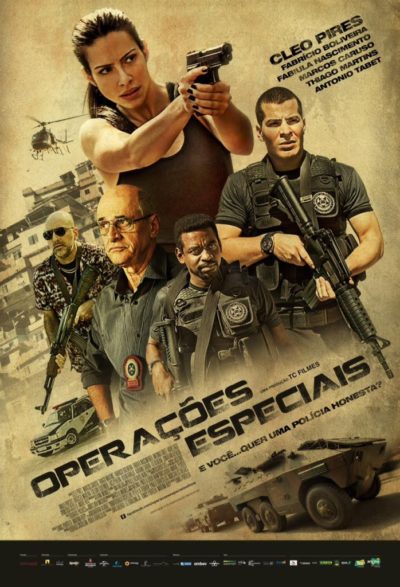★★★
“Good afternoon and good night.”
 I’ll treat these two seasons as one entity. Indeed, there’s a case to be made that you could include the first season as well, given the way they are inter-connected. However, it feels that the second and third are more directly linked. If you recall, the initial series had Sao Paolo cop Verônica Torres (Müller) looking into a domestic abuse case. However, this turns out not be as simple as it appears, with the abuser being protected by a mafia-like group, whose tentacles are embedded in a selection of power structures, including the police force. Series #2 and #3 take a broader scope, Verônica looking to take down elements of the group, and end their systemic abuse of women.
I’ll treat these two seasons as one entity. Indeed, there’s a case to be made that you could include the first season as well, given the way they are inter-connected. However, it feels that the second and third are more directly linked. If you recall, the initial series had Sao Paolo cop Verônica Torres (Müller) looking into a domestic abuse case. However, this turns out not be as simple as it appears, with the abuser being protected by a mafia-like group, whose tentacles are embedded in a selection of power structures, including the police force. Series #2 and #3 take a broader scope, Verônica looking to take down elements of the group, and end their systemic abuse of women.
The second series focuses on Verônica’s efforts against a church run by sketchy and abusive faith healer Matias (Gianecchini). He has a line in inviting poor hurt souls – albeit only attractive, young women – to stay on the church’s property, where bad stuff happens to them. His wife is firmly beneath Matias’s thumb, and Verônica is now operating more less unofficially, though with tacit help from some on the force. Her only hope is to get to the daughter, Angela (Castanho), who is lesbian because Netflix. If she can convince Angela her father is not the saint his public persona appears to be, they might have a chance to expose his crimes. But doing so simply removes another layer of the conspiracy, with the shadowy “Doúm” remaining at large.
Which is where the third series comes in, as she finds Doúm to be horse breeder Jeronimo (Santoro). Initially, he seems on her side, which is remarkably naive of her, because he set my alarm bells ringing from the very start. Doesn’t help that he looks like a creepy combination of Liam Neeson, Kid Rock and Tommy Wiseau. And that’s before we learn about the questionable relationship with his mother, or that he grew up in the same abusive orphanage as Marias. Such concerns are very justified, because it turns out Jeronimo is not just breeding horses for fun and profit. He has his eye on both Angela and Verônica’s daughter, as the next brood mares, ready to be auctioned off to rich clients.
I felt it all got a little silly and excessive in the third season, with the plot requiring events which stretched plausibility to a breaking point. It’s likely a good thing it was only half the length of the second series, at three episodes rather than six. While it ends with Verônica looking to continue the fight for justice in her extra-legal capacity, the show was canceled, and I feel that’s wise given the steadily diminishing returns. There was a nice sense of circularity, series 3 ending in a suicide, the way the very first episode opened. However, the televisual cycle of abuse was becoming repetitive, although both the second and third seasons had some interesting revelations about Verônica’s family background. While Müller’s performance held things together, it’s likely better this stopped too soon, rather than too late.
Creator: Raphael Montes
Star: Taina Müller, Reynaldo Gianecchini, Klara Castanho, Rodrigo Santoro






 I had to work quite hard to see this: while it is on Tubi, the subtitles there were only in Spanish, and so not much help (I’m still at the “Donde esta la biblioteca?” level). Fortunately, it then turned up on Vudu, and I bravely made my way through their crappy interface and frequent adverts to bring you this review. It was worth it. This is a solid slice of women-in-prison action/drama from Brazil, though perhaps less exploitative than I expected (especially given the country’s history in the sub-genre!) . I mean, Marins is a former model in Brazillian Playboy, so you’ll understand I had… certain expectations. Fortunately, the rest of the movie proved more than adequate to hold my attention.
I had to work quite hard to see this: while it is on Tubi, the subtitles there were only in Spanish, and so not much help (I’m still at the “Donde esta la biblioteca?” level). Fortunately, it then turned up on Vudu, and I bravely made my way through their crappy interface and frequent adverts to bring you this review. It was worth it. This is a solid slice of women-in-prison action/drama from Brazil, though perhaps less exploitative than I expected (especially given the country’s history in the sub-genre!) . I mean, Marins is a former model in Brazillian Playboy, so you’ll understand I had… certain expectations. Fortunately, the rest of the movie proved more than adequate to hold my attention.  The above odd combination is actually a fairly accurate assessment of what you have here. It’s a Yakuza action-thriller… but rather than being set in Tokyo or Osaka, is relocated to the Brazillian city of Sao Paolo. As an introductory credit helpfully informs us, this has the largest Japanese population of any city outside Japan. The story concerns two separate people’s quests for their pasts, which (to absolutely no-one’s surprise) turn out to be intertwined. One of these is Akemi (MASUMI), who as a young child was the sole survivor of a 1999 massacre of her Yakuza family back in Japan, was subsequently spirited away by allies and is now living in Brazil. The other is Shiro (Rhys-Meyers), an amnesiac who wakes up in hospital with no clue as to how he got there or his identity, except for a Japanese sword.
The above odd combination is actually a fairly accurate assessment of what you have here. It’s a Yakuza action-thriller… but rather than being set in Tokyo or Osaka, is relocated to the Brazillian city of Sao Paolo. As an introductory credit helpfully informs us, this has the largest Japanese population of any city outside Japan. The story concerns two separate people’s quests for their pasts, which (to absolutely no-one’s surprise) turn out to be intertwined. One of these is Akemi (MASUMI), who as a young child was the sole survivor of a 1999 massacre of her Yakuza family back in Japan, was subsequently spirited away by allies and is now living in Brazil. The other is Shiro (Rhys-Meyers), an amnesiac who wakes up in hospital with no clue as to how he got there or his identity, except for a Japanese sword.
 The Brazilian special police unit, known as BOPE (Batalhão de Operações Policiais Especiais) have a ferocious reputation for a hard-edged approach to its work. This is, likely, necessary for surviving the favelas (slums) of Rio in which they operate, going up against heavily-armed drug dealers. But with this also comes a “by any means necessary” approach, which has come in for criticism. They’ve been the topic of films before, most notably the incredible Elite Squad, which is an all-time classic of action cinema (and removed any chance of us attending the 2016 Olympics). It’s into this obviously macho environment, that rookie policewoman Francis (Pires) is dropped, and has to make her way.
The Brazilian special police unit, known as BOPE (Batalhão de Operações Policiais Especiais) have a ferocious reputation for a hard-edged approach to its work. This is, likely, necessary for surviving the favelas (slums) of Rio in which they operate, going up against heavily-armed drug dealers. But with this also comes a “by any means necessary” approach, which has come in for criticism. They’ve been the topic of films before, most notably the incredible Elite Squad, which is an all-time classic of action cinema (and removed any chance of us attending the 2016 Olympics). It’s into this obviously macho environment, that rookie policewoman Francis (Pires) is dropped, and has to make her way.
 This Brazillian-shot entry has a lot of good ideas, and some excellent moments, but comes up short with a script that borders on the incomprehensible. For example, in the middle of the film, the hero and heroine are both shot with tranquilizer darts – but no subsequent mention or explanation of this ever appears. This kind of sloppy plotting plagues the movie; it’s almost half-way through before the basic story becomes clear.
This Brazillian-shot entry has a lot of good ideas, and some excellent moments, but comes up short with a script that borders on the incomprehensible. For example, in the middle of the film, the hero and heroine are both shot with tranquilizer darts – but no subsequent mention or explanation of this ever appears. This kind of sloppy plotting plagues the movie; it’s almost half-way through before the basic story becomes clear. There’s lots to appreciate, not least the actors. As opposed to many films, Hagen here actually looks like she could kick your ass, and the flashback fight sequence is excellent – I’d like to have seen more of that, and all the battles are well staged and shot. While Perry is somewhat bland, he’s effective in action; Richardson is a B-movie veteran for almost two decades (Hollywood Chainsaw Hookers, Attack of the 60-foot Centrefold, etc.), and has a nice, world-weary air here. But Putney (left) is perhaps the best find as Daniel’s gun-toting sidekick, Jackie; the final scene between her and her boss is fabulously intense. And there are other cool little aspects, in things like Daniel’s henchmen.
There’s lots to appreciate, not least the actors. As opposed to many films, Hagen here actually looks like she could kick your ass, and the flashback fight sequence is excellent – I’d like to have seen more of that, and all the battles are well staged and shot. While Perry is somewhat bland, he’s effective in action; Richardson is a B-movie veteran for almost two decades (Hollywood Chainsaw Hookers, Attack of the 60-foot Centrefold, etc.), and has a nice, world-weary air here. But Putney (left) is perhaps the best find as Daniel’s gun-toting sidekick, Jackie; the final scene between her and her boss is fabulously intense. And there are other cool little aspects, in things like Daniel’s henchmen.